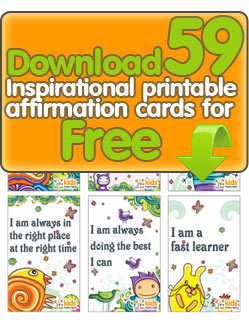Strengths Versus Weaknesses
What are your weaknesses? Is it a pretty long list? Okay. Now, what are your strengths? Does your list of weaknesses seem to be longer than your list of strengths? Like most individuals, we tend to focus a great deal of time on our weaknesses, but we focus very little time on our strengths. It’s amazing so many people focus just on fixing their weaknesses and not enough on improving their strengths, because strength building is much simpler than “weakness fixing.”
According to leaders within Positive Psychology, knowing your strengths and adhering to them will lead to greater levels of happiness in life. The same goes for your children. If you know their strengths and spend time focusing on them, then not only will your children begin to focus on their own strengths too, they will also reach greater levels of happiness as a human being.

Based on the work of Martin Seligman, leader within Positive Psychology, utilizing and recognizing your strengths brings you greater levels of happiness. When reflecting on ourselves, often times we immediately think of our weaknesses. How can we fix the things that we aren’t good at or can’t do? We not only do this to ourselves but perhaps to our children as well. We want our children to be successful, but at what price? Do we focus on their weaknesses to push them to do better; when in reality, it pushes them to be unhappy and you unhappy as well? Focusing on strengths is where greater levels of happiness lie for all individuals – adults and children alike.
There are two steps to become more in tuned with your strengths. The first is to simply recognize them. Recognize your strengths, because it is much easier and much more enjoyable to focus on your strengths versus focusing on your weaknesses. Martin Seligman has developed a tool to help you identify your strengths. This tool can be found on http://www.authentichappiness.sas.upenn.edu/books.aspx?id=187, and it will measure your personal qualities. Keep in mind that it will not measure your skills or talents, but it will actually measure qualities that you have.

The second and last step is to use your strengths. For example, when looking at the qualities and strengths of your child, if their strength is kindness, perhaps a career in helping people would suit them. If their strength is curiosity, perhaps you can take them on adventures that they have never experienced before. It could be something as simple as exploring different plants in a garden.
With the building of your personal strengths comes the building of confidence. That’s why recognizing and using your strengths is so important in leading to greater levels of happiness. You don’t have to ignore your weaknesses, because it is important to know what they are, but don’t spend your whole life trying to perfect something that doesn’t naturally come easy to you. There are small steps you can take for you and your children toward a life full of happiness and fulfillment. Recognizing and adhering to you and your children’s strengths is one of them.


